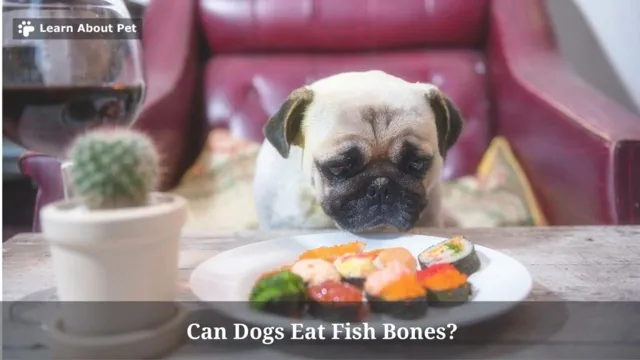Is It Safe for Dogs to Eat Fish Bones? Exploring the Health Risks

Are you concerned about giving your beloved pup fish bones as a treat? After all, you don’t want to put your pup’s health at risk. But, can dogs safely eat fish bones without any adverse health effects or risks? The answer is it depends. In this blog, we’ll explore the risks and benefits of feeding your pup fish bones and see if it’s safe for your pup or not. So, don’t worry, your pup can still enjoy a delicious fish dinner – just make sure to do it safely.
What are the Health Risks of Feeding Fish Bones to Dogs?
Fish bones are a common ingredient in many pet food products. However, it’s important to note that there are potential health risks associated with feeding fish bones to dogs. Fish bones can be a choking hazard, and they can also cause gastrointestinal distress. In addition, if the fish bones are not properly prepared, they may contain harmful bacteria or parasites, which can cause serious health issues. While it is possible to feed fish bones to dogs, it’s a good idea to take certain precautions.
First, it’s important to make sure that the fish bones are fully cooked, as raw fish can contain harmful bacteria. Second, it’s important to make sure that the fish bones are small enough that the dog can safely swallow them. Finally, it’s important to ensure that all sharp edges of the bones are removed, as these can cause severe injury to the digestive tract. Fortunately, there are several alternatives to feeding fish bones to dogs. Many brands of dog food contain fish as an ingredient, and these products are usually processed in such a way that any harmful bacteria or parasites are eliminated.
In addition, there are numerous treats and chews that are made from fish, which are safe for dogs to eat. Overall, it is possible for dogs to safely eat fish bones, but it’s important to take the proper precautions. Make sure that the fish bones are fully cooked and that all sharp edges are removed. Additionally, consider feeding your dog a fish-based product that has been properly processed to eliminate any potential health risks. By taking these steps, you can ensure that your dog can enjoy the benefits of a fish-based diet without running the risk of any serious health problems.
Are Cooked Fish Bones Safe for Dogs to Eat?
Fish bones are a common part of a meal, especially when eating a whole fish. However, many pet owners wonder if it is safe for their furry friends to eat cooked fish bones. The answer is, it depends. Fish bones are often brittle, so if they are cooked they can become even more so and can easily break off into small pieces. These small pieces can be a choking hazard for dogs, so it is best to avoid giving them to your pup.
Additionally, the bones can get stuck in their throats or potentially puncture their intestines. However, if you cook the fish bones in a stew or soup, the bones may soften enough to be safe for your pup. The bones should be large enough that your pet cannot swallow them whole, and you should always keep an eye on them to make sure they’re not eating too much. In addition to the potential choking hazard, cooked fish bones can also be bad for your dog’s digestive system. Fish bones contain phosphorus, which can be dangerous for your pup in large quantities.
Too much phosphorus can affect your dog’s kidneys, so it is important to be aware of how much your pup is consuming. So, while it may be tempting to give your pup a delicious fish dinner, it is important to remember that cooked fish bones can be a safety hazard and should not be given to your dog. If you are going to give your pup fish, it is best to do so in a stew or soup and to monitor them closely while they eat.

Can Dogs Eat Raw Fish Bones?
Dogs are carnivorous animals, and their diet primarily consists of meat and meat-based proteins. As such, it’s no surprise that many dog owners consider feeding their pup raw fish bones as a tasty treat. But can dogs eat raw fish bones? The answer is yes, with some important caveats. Fish bones, like those found in salmon, trout, and other fish, can be a nutritious and delicious treat for your pup. They contain calcium, phosphorus, and other minerals.
However, the bones must be raw to ensure they haven’t been cooked and hardened. Cooked bones can splinter and cause harm to your dog’s digestive system.
It’s also important to consider the size of the fish bone when considering whether or not to feed it to your pup. Small fish bones can be easily swallowed, but larger bones can become stuck in the throat and cause choking. A good rule of thumb is to avoid feeding your dog fish bones that are larger than the size of their mouth.It’s also important to keep in mind that fish bones can be a choking hazard. If your pup swallows a fish bone and it gets stuck in their throat, it can be difficult to remove and could even cause them to choke. If your pup is prone to swallowing food whole, it’s best to avoid giving them raw fish bones. Finally, it’s important to remember that raw fish bones can be contaminated with bacteria and parasites. Unless you are absolutely sure the fish you are feeding your pup is safe and free of contaminants, it’s best to avoid giving them raw fish bones.
In conclusion, raw fish bones can be a nutritious and delicious treat for dogs, but it’s important to be aware of the potential risks involved. Make sure the bones are small enough for your pup to swallow, and be sure to check for any contaminants
Is it Safe for Dogs to Eat Fish Heads and Tails?
It’s no secret that dogs love to eat, and many of them also love fish. But when it comes to feeding Fido fish, most pet owners are probably wondering: Is it safe for dogs to eat fish heads and tails? The short answer is yes, it is generally safe for dogs to eat fish heads and tails. However, there are certain precautions that pet owners should take to ensure their pup’s safety. First and foremost, the fish heads and tails should be cooked before giving them to your dog. Raw fish can contain harmful bacteria and parasites, which can make your pup sick.
If you are feeding your pup canned fish, be sure to check the label to make sure it is cooked and safe for your pup to eat. When feeding Fido fish heads and tails, it is also important to make sure that the bones have been removed. Fish bones can be very sharp, and they can easily get stuck in your pup’s throat or intestines. If you are feeding your pup fresh fish, be sure to remove all of the bones before giving it to them.
Finally, it is important to consider the size of the fish heads and tails that you are giving your pup.Large fish can contain more bones and other potential hazards, so it is best to stick with small fish heads and tails. Overall, it is generally safe for dogs to eat fish heads and tails as long as the fish is cooked and the bones are removed. However, pet owners should still take the necessary precautions to ensure their pup’s safety. If you have any concerns about feeding your pup fish heads and tails, it is best to consult with your veterinarian.
What Fish Bones Can Dogs Not Eat?
Dogs are known for their natural affinity for food, but it is important to keep in mind that not all foods are safe for them to consume. Fish bones, in particular, can be a dangerous snack for dogs. The sharp bones can cut their digestive tract, causing a number of medical issues, including possible organ damage. The most common symptom of a dog eating fish bones is vomiting, but it can also cause some more serious issues such as intestinal obstruction. This can be very dangerous and can even be life-threatening.
The obstruction can cause discomfort and pain, as well as an inability to eat or drink. In more severe cases, the obstruction can even cause the intestine to perforate, which can lead to infection. In addition to the potential for physical damage, fish bones can also contain harmful bacteria, parasites, and other contaminants that can cause food poisoning. Eating fish bones can also lead to a build-up of toxins in the body, which can lead to a host of other health problems. It is best to avoid giving your dog any fish bones, as the risks far outweigh any potential benefits.
It is also important to make sure that any fish you give your dog is free from bones. If you are unsure, it is best to seek advice from your veterinarian to ensure that your pet is getting the safest and healthiest diet possible.
Conclusion
The short answer is: with a lot of practice and some clever chewing techniques! Dogs have an incredible ability to break down and digest small fish bones, but it’s important to be mindful of potential health risks and always monitor your pup’s eating habits. Who knows, maybe one day your pup will be the next great fish bone master!”

FAQs
How can dogs eat fish bones?
Dogs can eat fish bones if they are small enough to swallow whole. Fish bones are not as brittle as other bones and can be broken down easily by the digestive juices of a dog’s stomach.




